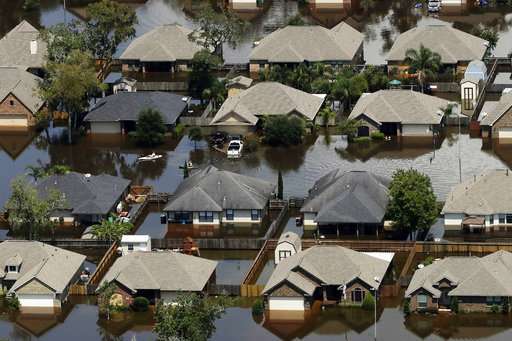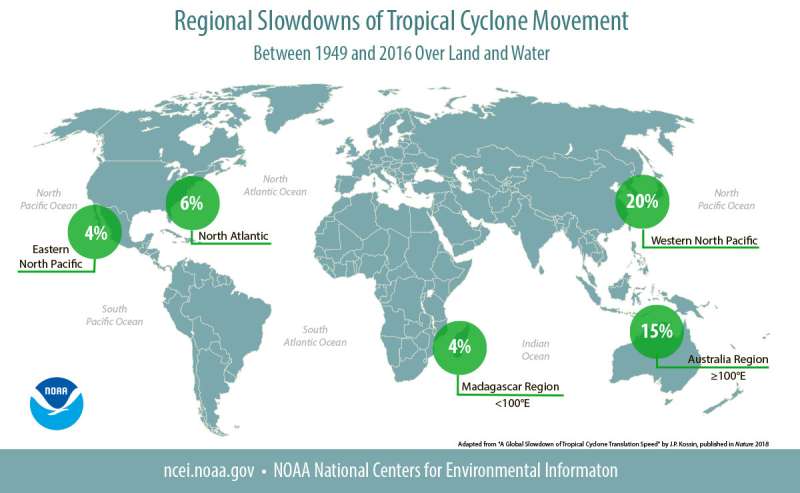Unhurried hurricanes: Study says tropical cyclones slowing

Tropical cyclones around the world are moving slightly slower over land and water, dumping more rain as they stall, just as Hurricane Harvey did last year, a new study found.
This isn't about how powerful a storm's winds are, just how fast it chugs along. Storms in the last few years—before 2017's Harvey—were moving about 10 percent slower globally than in the late 1940s and 1950s, according to a study published in Nature Wednesday. Storms worldwide in 2016 moved about 1.25 mph (2 kph) slower than 60 some years ago.
In the Atlantic Ocean basin, the slowdown was not dramatic, just 6 percent. But when Atlantic storms hit land—like Harvey—the study said the slowdown is a significant 20 percent. Atlantic storms that make landfall moved 2.9 mph (4.7 kph) slower than 60 some years ago, it said.
"The slower a storm goes, the more rain it's going to dump in any particular area," said study author James Kossin, a government climate scientist. "Hurricane Harvey last year was a great example of what a slow storm can do."
Harvey, which killed at least 68 people, dropped a record 60 inches of rain in parts of southeastern Texas, according to the National Hurricane Center .
Kossin started his research before the 2017 season, stopping his analysis at 2016. Adding last year's storms would have made the slowdown a bit more prominent, he said.

Unhurried hurricanes also mean strong winds blowing more often over the same place and possibly more storm surge, Kossin said.
The trend has all the signs of human-caused climate change, Kossin said. But the study did not look at causes by using computer models to simulate the Earth with and without warming. It is based solely on past observations, he said.
Another study that came out recently, using computer models, concluded that future storm movements will slow because of climate change.
Climate change is tinkering with and slowing down atmospheric circulation patterns—the wind currents that move weather along, Kossin said.
Outside scientists were skeptical. That's mostly because data before the 1970s is not reliable so it is hard to make such conclusions, said University of Miami hurricane researcher Brian McNoldy.
Kossin acknowledged problems with pre-1970s data but said that most of it deals with how strong storms are. Older data on location, and thus movement, are more reliable, Kossin said.
"Kossin is right that a 10 percent change in tropical cyclone motion would be an important change due to its effect on accumulated precipitation," Texas state climatologist John Nielsen-Gammon said in an email. "I just need more convincing that there actually has been a 10 percent motion change."
More information: James P. Kossin. A global slowdown of tropical-cyclone translation speed, Nature (2018). DOI: 10.1038/s41586-018-0158-3
Journal information: Nature
© 2018 The Associated Press. All rights reserved.





















